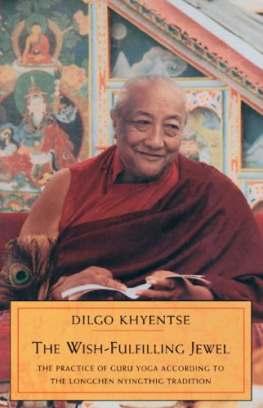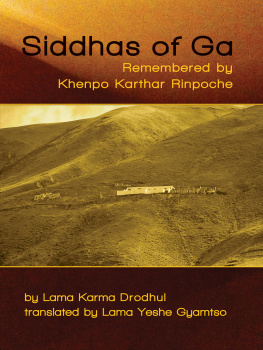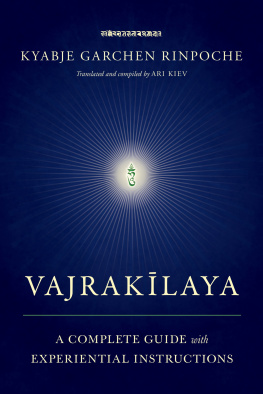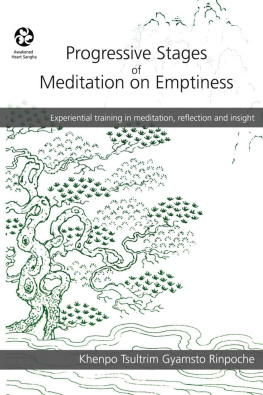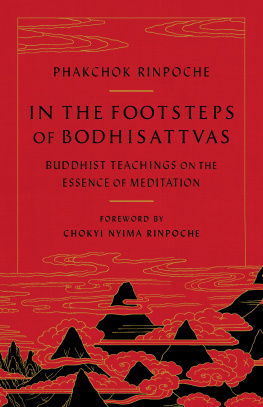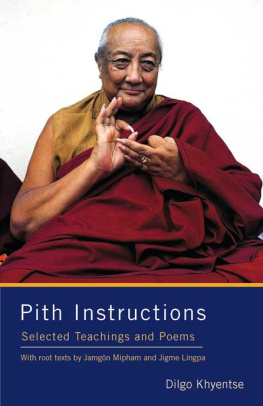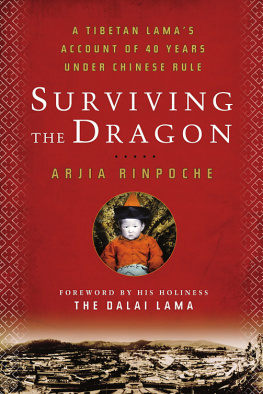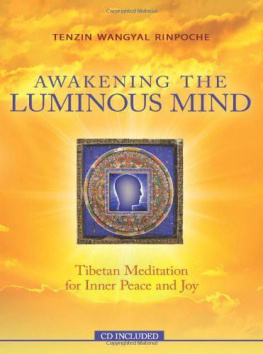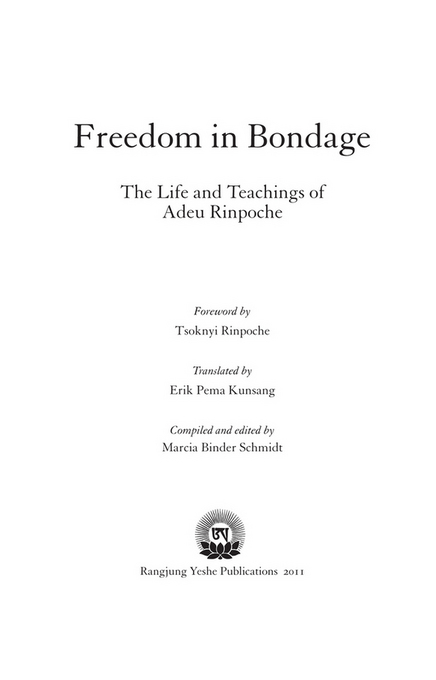R ANGJUNG Y ESHE B OOKS WWW.RANGJUNG.COM
PADMASAMBHAVA
Treasures from Juniper Ridge Advice from the Lotus-Born
Dakini Teachings
PADMASAMBHAVA AND JAMGN KONGTRL
The Light of Wisdom, Vol. 1The Light of Wisdom, Vol. 2
YESHE TSOGYAL
The Lotus-Born
GAMPOPA
The Precious Garland of the Sublime Path
DAKPO TASHI NAMGYAL
Clarifying the Natural State
TSELE NATSOK RANGDRL
Mirror of Mindfulness Empowerment Heart Lamp
CHOKGYUR LINGPA
Ocean of Amrita The Great Gate Skillful Grace
JAMGN MIPHAM RINPOCHE
Gateway to Knowledge, Vol. 1, Vol. 2, & Vol. 3
TULKU URGYEN RINPOCHE
Blazing Splendor Rainbow Painting As It Is, Vol. 1 As It Is,
Vol. 2 Vajra Speech Repeating the Words of the Buddha
KHENCHEN THRANGU RINPOCHE
Crystal Clear Songs of Naropa King of Samadhi
Buddha Nature
CHKYI NYIMA RINPOCHE
Present Fresh Wakefulness Indisputable Truth Union of
Mahamudra & Dzogchen Bardo Guidebook Song of Karmapa
TSIKEY CHOKLING RINPOCHE
Lotus Ocean
TULKU THONDUP
Enlightened Living
ORGYEN TOBGYAL RINPOCHE
Life & Teachings of Chokgyur Lingpa
DZIGAR KONGTRL
Uncommon Happiness
TSOKNYI RINPOCHE
Fearless Simplicity Carefree Dignity
DZOGCHEN TRILOGY COMPILED BY MARCIA BINDER SCHMIDT
Dzogchen Primer Dzogchen Essentials Quintessential Dzogchen
ERIK PEMA KUNSANG
Wellsprings of the Great Perfection A Tibetan Buddhist
Companion The Rangjung Yeshe Tibetan-English Dictionary of Buddhist Culture
MARCIA DECHEN WANGMO
Confessions of a Gypsy Yogini
ADEU RINPOCHE
Freedom in Bondage
TRAKTUNG DUDJOM LINGPA
Clear Mirror
R ANGJUNG Y ESHE P UBLICATIONS
Flat 5a, Greenview Garden,
125 Robinson Road, Hong Kong
Address letters to:
Rangjung Yeshe Publications
Ka-Nying Shedrub Ling Monastery
P.O. Box 1200, Kathmandu, Nepal
www.rangjung.com
Copyright 2011 Marcia Binder Schmidt & Rangjung Yeshe Publications
All rights reserved. No part of this book may be reproduced
without written permission from the publisher
Distributed to the Book Trade by North Atlantic Books & Random House
Publication Data:
Adeu Rinpoche
F REEDOM IN B ONDAGE , The Life & Teachings of Adeu Rinpoche.
Foreword by Tsoknyi Rinpoche
Translated by Erik Pema Kunsang, (Erik Hein Schmidt).
Edited & Compiled by Marcia Binder Schmidt.
eISBN: 978-1-58394-346-5
1. Religious LifeBuddhism. 2. BuddhismDoctrines.
3. VajrayanaTibet.
Cover Design: Maryann Lipaj
v3.1
C ONTENTS
P REFACE
Marcia Binder Schmidt
T he first time that I met Adeu Rinpoche was in 1989 up at Nagi Nunnery above the Kathmandu Valley in Nepal, when he had agreed to allow some of Tulku Urgyen Rinpoches close, Western students to sit in on the empowerment of the Three Sections of Dzogchen, the Dzogchen Desum, a highly restricted, revealed treasure (terma) of Chokgyur Dechen Lingpa. This was no small acquiescence, since this empowerment is extremely profound and rare. Previously, the Desum had been passed down to only one or two people at any given transmission. The seal of secrecy had only been opened in Tulku Urgyen Rinpoches generation. Even the great master Jamgon Kongtrul did not receive the Three Sections the first time it was given.
My memories of Adeu Rinpoche from that time are rather vague, though I do remember that he seemed kind and gentle. Of course I had heard that he had spent many years in a Chinese prison camp, but aside from sitting in the same room with him for those five days, we did not interact much. It was not until nearly ten years later when I received teachings from him that his amazing lucidity and understanding became apparent to me. From then on, he became, after Tulku Urgyen Rinpoche, my most important and beloved teacher.
The selections gathered in this book, which span the period between 1999 and 2006, are but a small sampling of the profound and remarkable way in which Adeu Rinpoche imparted the Dharma. He gave instructions that were precise and rich in detail, yet simple and direct. His style reflected the depth of his experience, realization and compassion, as you will surely discover for yourself as you read his teachings. Adeu Rinpoches own account of the time he was held in a Chinese prison camp was gathered primarily from conversations we had on a small island off the coast of China called Putoshan.
While at Putoshan, Rinpoche was asked how he was able to endure such terrible afflictions as unjust imprisonment and punishment without harboring any anger or resentment. Over the next few days he recounted what he went through from the time of the Chinese crackdown in 1955, to his imprisonment and up until his release from prison in 1982.
During our three weeks together on the island, Adeu Rinpoche gave teachings four times a day: early morning in Tibetan, mid-morning and early afternoon with a translator for the Westerners, and in the evening he again taught the lamas.
Almost immediately these meetings aroused suspicion among the hotel staff. No one seemed to speak English, on the island, so, to get around, I asked for a guide. I was provided with a spunky young woman with nominal language skills who instantly decided that I was her new best friend and shadowed me for the rest of my stay. We later found out that she was the wife of the head of the secret police. Soon the hotel staff became increasingly uncomfortable and requested us to change rooms, but we refused. Finally they forced us out of our rooms for a couple of afternoons under the pretense that the rooms needed work.
During my various travels in remote areas of Tibet I have noticed that hotels typically only have a few rooms allocated for Westerners, even though there are many empty rooms that locals can rent. I suspect that the reason is that only certain rooms are wired with hidden microphones to record the occupants conversations.
During the evenings, when the lamas were being taught, we Westerners would gather in one room and watch TV together. There was an incredible series on each night about Genghis Khan that, though spectacular in presentation, lacked any subtitles. So, each of us would take turns improvising what seemed to be appropriate dialogue for the action and dramatic visuals. Imagine my surprise several years later when one of the lamas who had been there told us that all this chatter had been dutifully taped and translated for the authorities. But we were pretty oblivious to this at the time, and continued with our teaching schedule, left the island, and returned to Shanghai where we prepared to depart to our respective destinations.
When we arrived at the airport, we came under tight surveillance and stringent searches of our luggage from very suspicious officials. In particular, the security officer who X-rayed my hand luggage glared at me relentlessly, spoke roughly and was convinced I was hiding something; I returned his aggression with similar disdain. As our eyes locked, I stared at him until he let the bag go with only one semi-careful search, which fortunately he did. As it turned out, I was the only one from our group to get out with any tapes; the others had theirs confiscated. We never did find out what we were suspected of. Nothing incriminating was found on the tapes, because none of us was in the slightest degree political.


